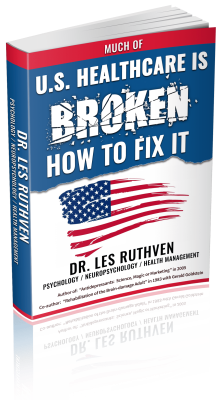By Leslie “Les” Ruthven, Ph.D. in clinical psychology
Email: dr.les.ruthven@gmail.com
Health blog: www.ruthvenassessments.com
The most costly and largely preventable diseases in the U.S are
- Type 2 diabetes, annual cost $327 billion
- Heart disease, annual cost $316 billion
- Cancer, annual cost $158 billion
- Stroke, annual cost $74 billion
- Chronic Obstructive Pulmonary Disease, annual cost $50 billion
The above costs for these largely preventable diseases is fast approaching $1 trillion dollars a year, about 25% of the total healthcare bill which is just over 4 trillion dollars yearly! Some of the bill is society caused (e.g., pollution) but the greater part is due to the behavior of individual patients, especially self-injurious behaviors such as eating too much resulting in overweight/obesity, poor nutrition, sedentary life-style, smoking, abuse of alcohol, inability to manage one’s stress and others. Traditionally physicians whose training is basically in the biological and physical sciences look for biophysical solutions such as drugs for the above and other health problems; however, for the largely preventable diseases one can legitimately say the illness is in the patient’s behavior and not in the disease! Rather than arranging treatment for the causes modern medicine treats the disease.
Many years ago when the writer was diagnosed with Type 2 diabetes my physician on the day of diagnosis offered a prescription of Metformin; however, I refused and elected to change my eating behavior and achieved a weight loss of 40 pounds. TV Type 2 drug commercials promise an A1C of 7 but mine is now 5.5. At the time I was on hypertensive medication for chronic high blood pressure but with favorable life style changes in time I was able to go off blood pressure medication as well.
If the reader believes that my training as a psychologist helped me to achieve life style goals the person would be right because helping patients change their behavior is perhaps the key role of a psychologist. Many patients with a preventable disease, and no training in psychology or the assistance of a psychologist to achieve their health goals, are able to change their self-injurious behavior on their own and improve their health with behavior change alone. However, a large number of patients cannot achieve health goals on their own and require professional assistance; however, such expert assistance is not available from medically trained professionals. When the health problem is effectively treated with behavior change psychologists are the best trained health professionals to provide the knowhow and skills for the patient to change their self-injurious behavior.
The title of this paper suggests the writer is not at all optimistic that we will ever have better and lower cost healthcare. I attribute this to the fact that the medically trained have almost complete control over the nature and kind of care patients receive. Unfortunately it is stacked in favor of biophysical solutions such as prescription drugs when often the health problems arises from non-organic causes.
Psychological, social, behavioral, stress, untoward life difficulty of the patient play a major factor in disease and non-disease health problems but these are often ignored and not addressed in current healthcare delivery.
Is there a current healthcare entity that has the potential to bring about better healthcare at lower cost by treating many health problems more comprehensively than currently?
Yes, there is and it is the employer self-insured employee health plans. The reason is this entity has the power of payment, the ability to decide what services will or will not be reimbursed and what health professional should or should not provide services outside of their training and expertise. However, this entity will have to be educated to follow the available sound health research. I use the word sound research because I find much of the health research I read in the health literature is scientifically unsound, and very often the advantage of the drug or therapy is statistically superior to the placebo but of minimal clinical value. Right now these self-insured health plans depend on physicians to write their health and reimbursement plan but when these plans have the requisite knowledge these plans can write their own health plan for more comprehensive and better treatment.



